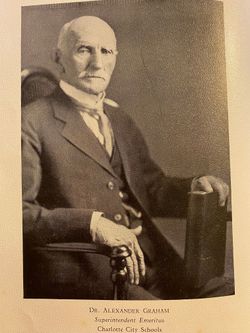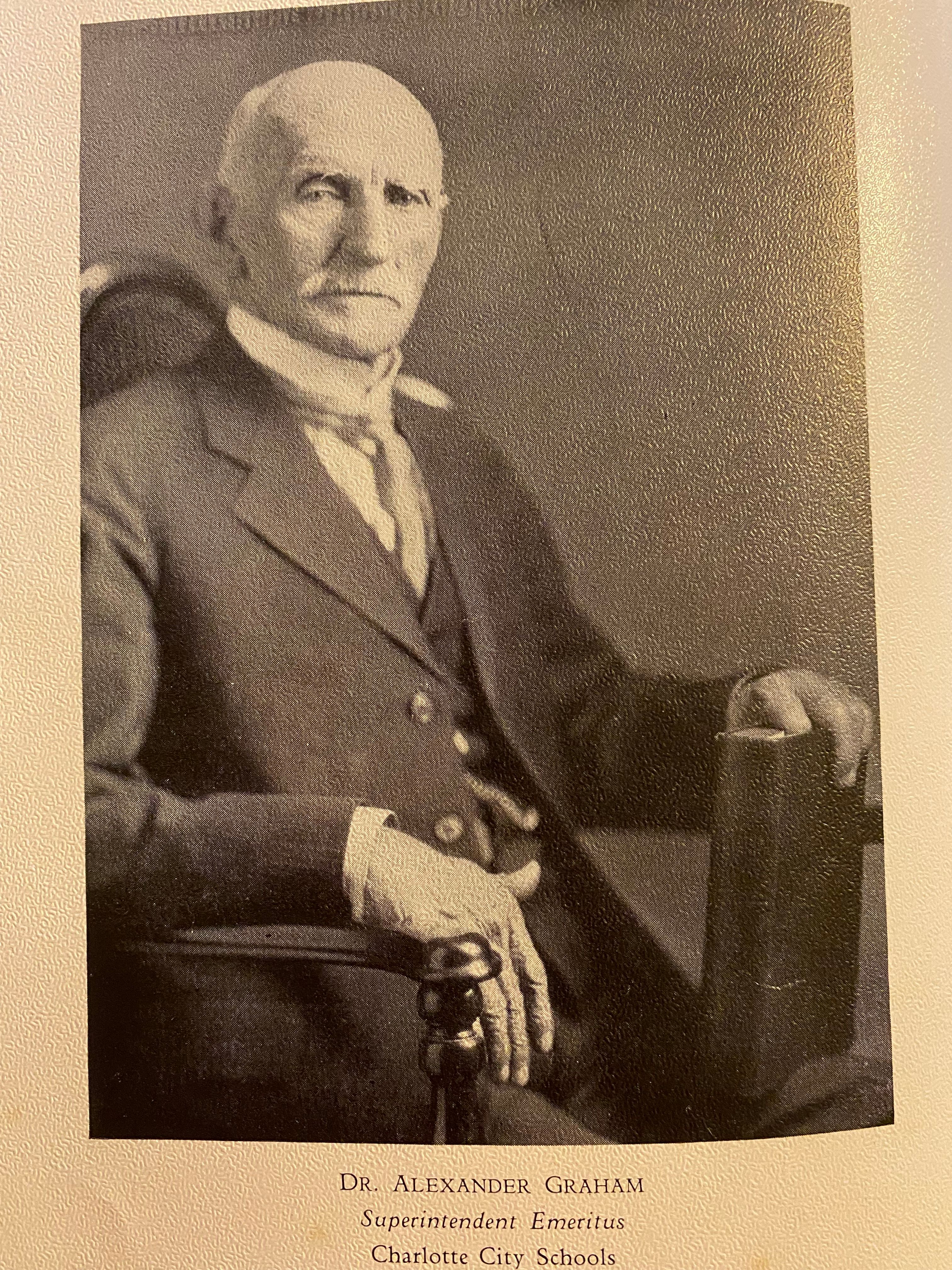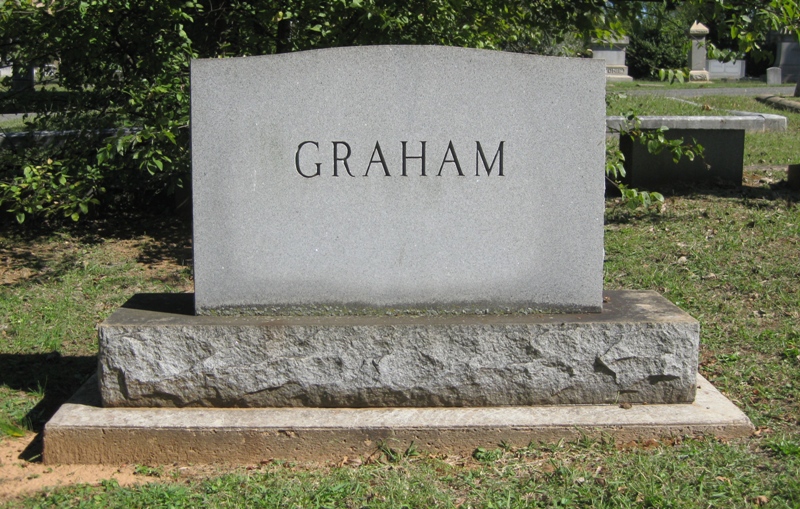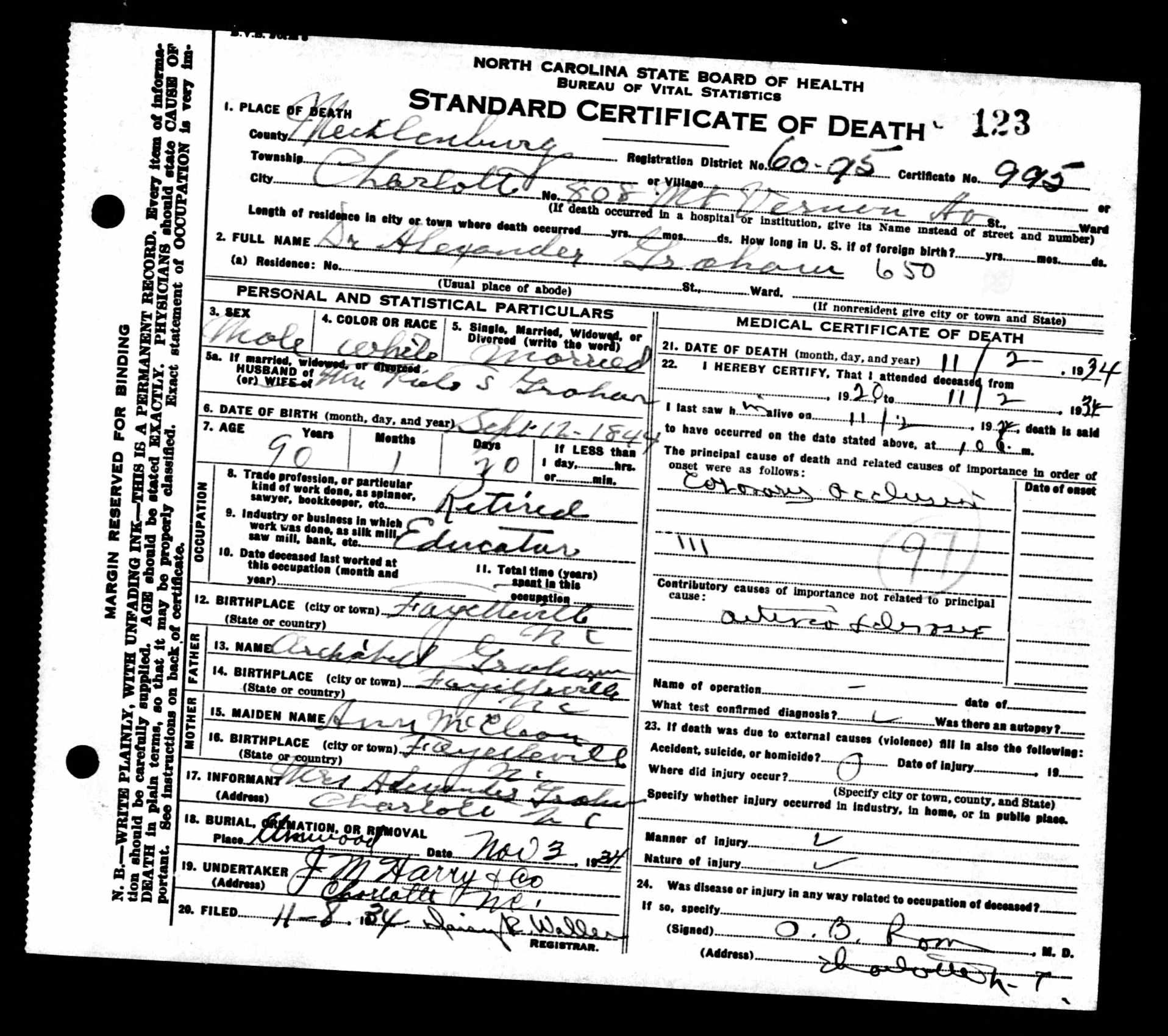Funeral services will be held at 4 o'clock this afternoon at the home, 808 Mount Vernon avenue, with his pastor, Dr. J. F. Hardie, pastor of the Second Presbyterian church, in charge. Interment will be in Elmwood cemetery.
Surviving Dr. Graham are the widow, before marriage Miss Kate Sloan of Sampson county, and several children: Dr. Archibald Graham of Hibben, Minn.; Dr. Frank Porter Graham, president of the University of North Carolina Chapel Hill; Misses Mary Graham and Hattie Graham, Charlotte, and George Graham of Atlanta, Ga.; Mrs. Shipp Sanders of Chapel Hill and Mrs. Henry Shanks of Birmingham, Ala. Neill Graham, another son, died several years ago, and David Graham, the oldest son, was killed at Chateau-Thierry during the World war.
FATHER OF CITY SCHOOLS.
Dr. Graham for more than half a century had been looked upon as the father of the city's system of public schools and was known throughout the state and nation as a foremost leader in the cause of public education.
Perhaps not a man in Charlotte was as well known, for he had touched the lives of virtually the city's entire citizenship in their school days, and certainly no citizen was more beloved. He had the faculty of making strong friendships that survived through the years.
Not only had Dr. Graham achieved prominence in the educational field, but so have numerous close relatives, and the Graham family is known as the one family in the state most distinguished for its endeavors in the field of public education. His son, Dr. Frank Graham, is president of the University of North Carolina and one of the nation's foremost educators. Another son, Prof. George Graham, teaches in Atlanta. His nephew, the late Dr. Howard Kidder Graham, was president of the University of North Carolina and is credited with having started the movement that has led the university into the forefront of American universities. Miss Mary Owen Graham, a niece. sister of Dr. Edward Kidder Graham, was for many years assistant superintendent of schools of this county and was also conspicuously successful as president of Peace institute at Raleigh. A son-in-law, Dr. Shipp Sanders, is a professor at the university. Numerous others related to Dr. Graham are prominent in the field of education.
PALLBEARERS NAMED.
Pallbearers named last night are George Rose, William Anderson, R. S. Hutchinson, John Henry McAden, Thomas W. Alexander, Sam J. Taylor, Charles W. Tillet, Jr., Rufus Johnston, H. P. Harding, E. H. Garinger, W. H. Belk, Dr. Otho Ross, John Purser, Sr., Louis Williamson, Henry Allison, all of Charlotte, and M. C. S. Noble, Jr., E. P. Moses, and Dr. William DeB. MacNider, all of Chapel Hill.
Dr. Graham was a pioneer in new educational life of North Carolina, being instrumental in formulating and furthering the graded school system. He was closely associated as a worker with those other conspicuous leaders, including Dr. E. A. Alderman, M. C. S. Noble and Charles D. McIver, and he traveled over the state helping establish graded schools in more than 50 counties.
He was superintendent of the Charlotte public schools from 1888 to 1913, being succeeded in the later year by H. P. Harding. The Charlotte public schools have had four superintendents. Predecessors of Dr. Graham were T. J. Mitchell, organizer of the city school system her, 1882-1886, and J. T. Corlew, 1886-1888.
Dr. Graham was born at Fayetteville, September 12, 1844, and is a lineal descendant of Col. Alexander McAllister, who served as a field officer in the Revolutionary war. His parents were Archibald and Anne McLean Graham. Alexander Graham received his early educational advantages in private schools in Fayetteville. He was only 16 when the war broke out, and in the last year in the struggle between the states he served in Company B, third North Carolina troops, participating in the battle of Bentonville at the close of the war.
UNIVERSITY GRADUATE.
He attended the University of North Carolina, receiving the degree of bachelor of arts in 1869. He pursued further work there and received in 1880 his master of Arts degree. Recognizing his contribution to the well being of the state, his alma mater conferred upon him in 1920 the honorary degree of doctor of laws. In 1873 he was graduated as LLB from Columbia university of New York. For several years thereafter he practiced law at Fayetteville.
Feeling the call to educate the youth of the state, he organized the Fayetteville graded schools and served as superintendent from 1878 to 1888, in the latter year coming to Charlotte as superintendent of schools. Upon his retirement in 1913 from the superintendencey of the local schools, he was made assistant superintendent and served in that capacity until 1927.
LEADER IN COLLEGE.
At the University of North Carolina Dr. Graham was a member of the Zeta Psi fraternity, member of the Phi literary society and captain of the baseball club.
He married Miss Catherine Bryan Sloan, daughter of Dr. David Dickson Sloan of Sampson county, January 28, 1875.
As a historian Dr. Graham has gained distinction, especially in recounting the history of Mecklenburg county and in establishing the authenticity of the signing of the Mecklenburg Declaration of Independence. He was at one time president of the North Carolina Education association. He was named by Former Governor Angus W. McLean, a member of the board of trustees of A. and T. college for negroes at Greensboro. He was a member of the Second Presbyterian church.
The death of Dr. Graham leaves Col. E. L. Baxter Davidson of Charlotte as the sole surviving member of the Mecklenburg Monument association, under whose auspices the handsome chart honoring the signers of the Mecklenburg Declaration of Independence was erected.
Dr. Graham, Colonel Davidson and Eli Springs, who died some time ago, were the last surviving members of that association. On the occasion of the unveiling of the monument in front of the old courthouse on South Tryon street Adlai Stevenson, vice president of the United States, was the speaker. The monument has been moved to its new location on East Trade street.
The Charlotte Observer
Charlotte, NC
Saturday, November 3, 1934
Page 15
----------
Paternal link provided by Leza Wallace.
Funeral services will be held at 4 o'clock this afternoon at the home, 808 Mount Vernon avenue, with his pastor, Dr. J. F. Hardie, pastor of the Second Presbyterian church, in charge. Interment will be in Elmwood cemetery.
Surviving Dr. Graham are the widow, before marriage Miss Kate Sloan of Sampson county, and several children: Dr. Archibald Graham of Hibben, Minn.; Dr. Frank Porter Graham, president of the University of North Carolina Chapel Hill; Misses Mary Graham and Hattie Graham, Charlotte, and George Graham of Atlanta, Ga.; Mrs. Shipp Sanders of Chapel Hill and Mrs. Henry Shanks of Birmingham, Ala. Neill Graham, another son, died several years ago, and David Graham, the oldest son, was killed at Chateau-Thierry during the World war.
FATHER OF CITY SCHOOLS.
Dr. Graham for more than half a century had been looked upon as the father of the city's system of public schools and was known throughout the state and nation as a foremost leader in the cause of public education.
Perhaps not a man in Charlotte was as well known, for he had touched the lives of virtually the city's entire citizenship in their school days, and certainly no citizen was more beloved. He had the faculty of making strong friendships that survived through the years.
Not only had Dr. Graham achieved prominence in the educational field, but so have numerous close relatives, and the Graham family is known as the one family in the state most distinguished for its endeavors in the field of public education. His son, Dr. Frank Graham, is president of the University of North Carolina and one of the nation's foremost educators. Another son, Prof. George Graham, teaches in Atlanta. His nephew, the late Dr. Howard Kidder Graham, was president of the University of North Carolina and is credited with having started the movement that has led the university into the forefront of American universities. Miss Mary Owen Graham, a niece. sister of Dr. Edward Kidder Graham, was for many years assistant superintendent of schools of this county and was also conspicuously successful as president of Peace institute at Raleigh. A son-in-law, Dr. Shipp Sanders, is a professor at the university. Numerous others related to Dr. Graham are prominent in the field of education.
PALLBEARERS NAMED.
Pallbearers named last night are George Rose, William Anderson, R. S. Hutchinson, John Henry McAden, Thomas W. Alexander, Sam J. Taylor, Charles W. Tillet, Jr., Rufus Johnston, H. P. Harding, E. H. Garinger, W. H. Belk, Dr. Otho Ross, John Purser, Sr., Louis Williamson, Henry Allison, all of Charlotte, and M. C. S. Noble, Jr., E. P. Moses, and Dr. William DeB. MacNider, all of Chapel Hill.
Dr. Graham was a pioneer in new educational life of North Carolina, being instrumental in formulating and furthering the graded school system. He was closely associated as a worker with those other conspicuous leaders, including Dr. E. A. Alderman, M. C. S. Noble and Charles D. McIver, and he traveled over the state helping establish graded schools in more than 50 counties.
He was superintendent of the Charlotte public schools from 1888 to 1913, being succeeded in the later year by H. P. Harding. The Charlotte public schools have had four superintendents. Predecessors of Dr. Graham were T. J. Mitchell, organizer of the city school system her, 1882-1886, and J. T. Corlew, 1886-1888.
Dr. Graham was born at Fayetteville, September 12, 1844, and is a lineal descendant of Col. Alexander McAllister, who served as a field officer in the Revolutionary war. His parents were Archibald and Anne McLean Graham. Alexander Graham received his early educational advantages in private schools in Fayetteville. He was only 16 when the war broke out, and in the last year in the struggle between the states he served in Company B, third North Carolina troops, participating in the battle of Bentonville at the close of the war.
UNIVERSITY GRADUATE.
He attended the University of North Carolina, receiving the degree of bachelor of arts in 1869. He pursued further work there and received in 1880 his master of Arts degree. Recognizing his contribution to the well being of the state, his alma mater conferred upon him in 1920 the honorary degree of doctor of laws. In 1873 he was graduated as LLB from Columbia university of New York. For several years thereafter he practiced law at Fayetteville.
Feeling the call to educate the youth of the state, he organized the Fayetteville graded schools and served as superintendent from 1878 to 1888, in the latter year coming to Charlotte as superintendent of schools. Upon his retirement in 1913 from the superintendencey of the local schools, he was made assistant superintendent and served in that capacity until 1927.
LEADER IN COLLEGE.
At the University of North Carolina Dr. Graham was a member of the Zeta Psi fraternity, member of the Phi literary society and captain of the baseball club.
He married Miss Catherine Bryan Sloan, daughter of Dr. David Dickson Sloan of Sampson county, January 28, 1875.
As a historian Dr. Graham has gained distinction, especially in recounting the history of Mecklenburg county and in establishing the authenticity of the signing of the Mecklenburg Declaration of Independence. He was at one time president of the North Carolina Education association. He was named by Former Governor Angus W. McLean, a member of the board of trustees of A. and T. college for negroes at Greensboro. He was a member of the Second Presbyterian church.
The death of Dr. Graham leaves Col. E. L. Baxter Davidson of Charlotte as the sole surviving member of the Mecklenburg Monument association, under whose auspices the handsome chart honoring the signers of the Mecklenburg Declaration of Independence was erected.
Dr. Graham, Colonel Davidson and Eli Springs, who died some time ago, were the last surviving members of that association. On the occasion of the unveiling of the monument in front of the old courthouse on South Tryon street Adlai Stevenson, vice president of the United States, was the speaker. The monument has been moved to its new location on East Trade street.
The Charlotte Observer
Charlotte, NC
Saturday, November 3, 1934
Page 15
----------
Paternal link provided by Leza Wallace.
Family Members
Sponsored by Ancestry
Advertisement
Explore more
Sponsored by Ancestry
Advertisement






















